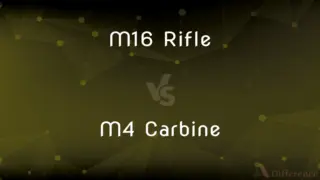Bottled Water vs. Tap Water — What's the Difference?
By Tayyaba Rehman — Published on February 12, 2024
Bottled water is commercially packaged, while tap water comes from municipal sources. Bottled water is convenient but may have environmental implications.

Difference Between Bottled Water and Tap Water
Table of Contents
ADVERTISEMENT
Key Differences
Bottled water is water sold in sealed containers, often derived from various sources, including springs or purified tap water. Marketed for purity and convenience, it's available in still or sparkling forms. Despite its popularity, concerns arise regarding environmental impact, plastic waste, and potential differences in quality compared to regulated tap water.
Tap water refers to water supplied to homes and businesses through municipal water systems. It undergoes rigorous testing and treatment for safety. While regulations ensure tap water meets quality standards, taste may vary based on local sources and treatment methods. It's a cost-effective and environmentally friendly option compared to bottled water.
Comparison Chart
Source
Various sources (springs, purified tap water)
Municipal water systems
Regulation
Varies; subject to FDA regulations for safety
Strictly regulated by EPA and local agencies
Environmental Impact
Contributes to plastic waste and environmental concerns
Generally more eco-friendly
ADVERTISEMENT
Cost
Relatively expensive due to packaging and marketing
Cost-effective, included in utility bills
Convenience
Convenient for on-the-go hydration
Easily accessible from taps
Compare with Definitions
Bottled Water
Sparkling bottled water contains added carbonation for a bubbly experience.
Sparkling bottled water is a popular choice for those seeking a fizzy alternative.
Tap Water
Easily accessible from taps in homes, businesses, and public spaces.
The convenience of turning on a tap for instant water access is a key benefit.
Bottled Water
Some argue that bottled water may not necessarily be purer than tap water.
Consumer preferences often drive the choice between tap and bottled water.
Tap Water
Taste may vary based on local sources and treatment methods.
Many cities take pride in their tap water, promoting its quality and distinct taste.
Bottled Water
Available in various types, including spring water and purified water.
Bottled spring water often boasts a natural, refreshing taste straight from the source.
Tap Water
Regulated by the EPA, tap water undergoes extensive testing for safety.
Municipal water treatment processes ensure tap water meets stringent quality standards.
Bottled Water
Subject to FDA regulations to ensure safety and quality standards.
Bottled water labels provide information on its source and purification methods.
Tap Water
Cost-effective and typically more affordable than bottled alternatives.
Tap water is a budget-friendly choice for households and businesses alike.
Bottled Water
Concerns about plastic waste have prompted a shift to eco-friendly packaging.
Many brands now offer bottled water in recyclable or biodegradable materials.
Tap Water
Considered environmentally friendly, reducing plastic waste.
Opting for tap water helps minimize the ecological footprint associated with bottled water.
Common Curiosities
Does tap water taste different in various locations?
Yes, tap water taste may vary based on local sources and treatment methods, influencing its flavor profile.
Are there eco-friendly alternatives to traditional bottled water packaging?
Yes, many brands offer bottled water in recyclable or biodegradable materials as part of efforts to reduce environmental impact.
Is bottled water safer than tap water?
Bottled water is subject to FDA regulations, but tap water, regulated by the EPA, undergoes rigorous testing, making both safe options.
Is tap water quality consistent across all regions?
While subject to strict regulations, tap water taste and quality can vary based on the water source and treatment methods in each region.
How does sparkling bottled water differ from still water?
Sparkling bottled water has added carbonation, providing a bubbly and effervescent experience compared to still water.
What treatment processes does tap water undergo?
Tap water undergoes treatments like filtration, disinfection, and often fluoridation to meet safety and quality standards set by regulatory authorities.
Can bottled water go bad?
Bottled water has no expiration date but may acquire a stale taste over time, influenced by factors like storage conditions and the bottle material.
Can tap water contain contaminants?
Tap water is subject to rigorous testing for contaminants, and when it meets regulatory standards, it is considered safe for consumption.
Is tap water cost-effective compared to bottled water?
Yes, tap water is generally more cost-effective as it is included in utility bills, making it an economical choice for hydration.
Are there health concerns related to long-term bottled water consumption?
Extended use of bottled water may contribute to environmental issues due to plastic waste, but its impact on individual health depends on various factors.
Are water quality standards the same for all water utilities?
While EPA sets federal standards, some states may have additional regulations, ensuring water quality meets or exceeds national benchmarks.
How is tap water regulated to ensure safety?
Tap water is regulated by the EPA, which sets standards, conducts testing, and oversees compliance to ensure it meets safety and quality criteria.
Why do some argue tap water is a more sustainable option?
Tap water is considered more environmentally friendly as it doesn't contribute to single-use plastic waste associated with bottled water.
Does the taste of bottled spring water vary from region to region?
Yes, the taste of bottled spring water can differ based on the geological characteristics of the source region.
Can sparkling bottled water be a substitute for sodas?
Sparkling bottled water, with added carbonation and various flavors, can offer a fizzy alternative to sodas with fewer calories and no added sugars.
Share Your Discovery

Previous Comparison
M16 Rifle vs. M4 Carbine
Next Comparison
New Testament vs. Old TestamentAuthor Spotlight
Written by
Tayyaba RehmanTayyaba Rehman is a distinguished writer, currently serving as a primary contributor to askdifference.com. As a researcher in semantics and etymology, Tayyaba's passion for the complexity of languages and their distinctions has found a perfect home on the platform. Tayyaba delves into the intricacies of language, distinguishing between commonly confused words and phrases, thereby providing clarity for readers worldwide.













































